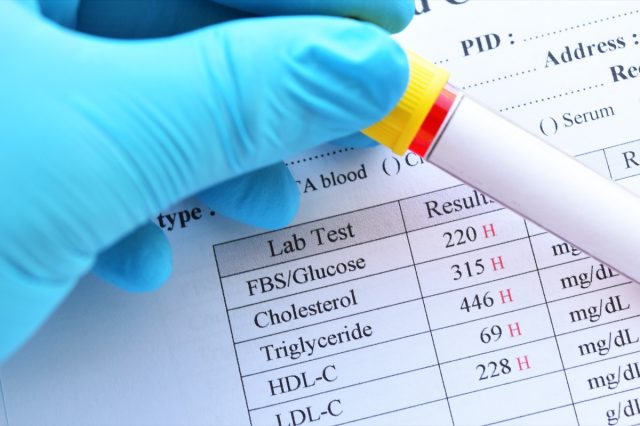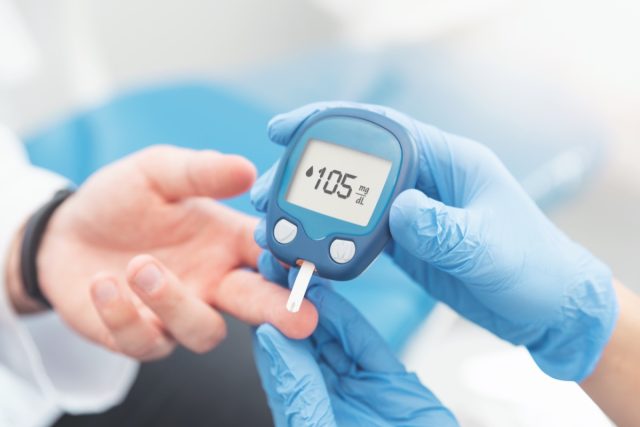
Diabetes is a chronic health condition that occurs when blood glucose—also called blood sugar—is too high as a result of the pancreas not producing enough insulin, or the body not effectively using the insulin produced. Diabetes is a major cause of kidney failure, heart attacks, blindness, stroke and lower limb amputation, and according to the CDC, a staggering 37.3 million people in the U.S. have diabetes (11.3% of the population) and 96 million people aged 18 years or older have prediabetes (38.0% of the adult population). Here’s what you need to know about what causes diabetes—and how to prevent it. Read on—and to ensure your health and the health of others, don’t miss these Sure Signs You’ve Already Had COVID.
Type 1 vs Type 2 Diabetes

Type 1 diabetes—also known as “juvenile diabetes”—is an autoimmune condition where the insulin-producing cells in the pancreas are destroyed. Type 2 diabetes, also known as “adult-onset” diabetes, is by far the most common type of diabetes and is directly correlated with certain lifestyle factors such as obesity, smoking, and lack of exercise—which is why, for some people, it can be reversed. For example, one clinical trial out of the UK showed a direct link between weight loss and reversal of Type 2 diabetes. “This is a radical change in our understanding of Type 2 diabetes,” says Dr. Roy Taylor, a professor at Newcastle University in England. “If we can get across the message that ‘yes, this is a reversible disease — that you will have no more diabetes medications, no more sitting in doctors’ rooms, no more excess health charges’ — that is enormously motivating.”
RELATED: Here’s How to Stop Aging, Say Experts
Speaking of Weight Loss…

Obesity greatly increases your risk of getting Type 2 diabetes—but losing even a small amount of weight can make a difference. “The strongest evidence we have at the moment suggests that type 2 diabetes is mainly put into remission by weight loss,” advises Diabetes U.K. “Remission is more likely if you lose weight as soon as possible after your diabetes diagnosis. However, we do know of people who have put their diabetes into remission 25 years after diagnosis. If you have obesity, your diabetes is more likely to go into remission if you lose a substantial amount of weight – 15kg (or 2 stone 5lbs) – as quickly and safely as possible following diagnosis.”
“I think the real importance of this work is for the patients themselves,” says Professor Taylor. “Many have described to me how embarking on the low calorie diet has been the only option to prevent what they thought — or had been told — was an inevitable decline into further medication and further ill health because of their diabetes. By studying the underlying mechanisms we have been able to demonstrate the simplicity of type 2 diabetes.”
RELATED: Secret Weight Loss Tricks to Melt Visceral Fat, Science Says
What About Prediabetes?

Prediabetes is a condition where blood sugar levels are higher than normal but not high enough to warrant a diabetes diagnosis. “Prediabetes is a little bit of a misleading term because it sort of makes it sound like it’s always the step before diabetes and you’re destined to develop diabetes,” says Kate Kirley, MD. “That is one thing we like people to understand is that prediabetes doesn’t mean that you are 100% destined to develop type 2 diabetes, however it’s probably the single most—and I’m talking doctor language now—predictive risk factor. It’s the single factor that tells us the most about somebody’s risk of eventually developing type 2 diabetes. It is that warning that your blood glucose is already being handled in an abnormal way by your body… And it’s actually a really good time to think about healthy changes that people can make to both prevent diabetes, but also improve their health in general.”
RELATED: Over 60? Here’s How to Look Decades Younger
Get On Your Feet

A sedentary lifestyle is a huge risk factor for Type 2 diabetes, whereas regular exercise can lower blood glucose levels and encourage insulin sensitivity. According to Harvard Health, “People with diabetes who walked at least two hours a week were less likely to die of heart disease than their sedentary counter- parts, and those who exercised three to four hours a week cut their risk even more. Women with diabetes who spent at least four hours a week doing moderate exercise (including walking) or vigorous exercise had a 40% lower risk of developing heart disease than those who didn’t exercise. These benefits persisted even after researchers adjusted for confounding factors, including BMI, smoking, and other heart disease risk factors.”
So What’s the #1 Cause of Diabetes?

The #1 cause for diabetes is high blood sugar—but it doesn’t have to be a life sentence. Losing weight, exercising regularly, not smoking, and eating a healthy diet all make a huge impact on reversing Type 2 diabetes. If you’re worried about diabetes and need help making changes, talk to a physician and come up with a plan you can stick with. And to ensure your health don’t miss these 101 Health Habits You Didn’t Know Were Deadly.








